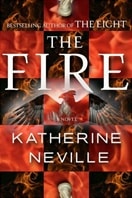(Pittsburgh Tribune-Review, Nov. 19, 2008, Regis Behe)
There are a few reasons why Katherine Neville waited 20 years to write the sequel to her wildly successful novel “The Eight.”
There were notions the book didn’t need a second act or the heightened expectations that would naturally be part of a sequel. As Neville says, “the scariest part was that people loved ‘The Eight’ so much.'”
 But another factor was at play, a factor beyond Neville’s ability to control. For “The Fire” (Ballantine, 451 pages) to make sense, time had to pass. And because “The Eight” was set in the early 1970s amid concerns about the Middle East and oil embargoes, Neville felt a shock of recognition when 9/11 occurred.
But another factor was at play, a factor beyond Neville’s ability to control. For “The Fire” (Ballantine, 451 pages) to make sense, time had to pass. And because “The Eight” was set in the early 1970s amid concerns about the Middle East and oil embargoes, Neville felt a shock of recognition when 9/11 occurred.
“When the plane hit the Pentagon across the river from my apartment in Georgetown (in Washington, D.C.), I realized the book that I was writing wasn’t the book that I thought I was writing,” says Neville, who visits Mystery Lovers Bookshop in Oakmont on Saturday. “These events having to do with OPEC and oil and Arabs and Islam were occurring again. It was like a higher turn of the spiral. We forget the period (‘The Eight’) was set; in 1973, there were a lot of plane and boat hijackings and wars going on all over the Middle East.”
Since “The Eight” was published in 1988, it has become a global phenomenon, selling 1.5 million copies worldwide. The plot concerns a mythical chess set, the Montglane Service, said to possess mystical powers. Neville’s writing was so convincing that she still hears from readers who are “completely devastated when they realize I invented this chess set, and it’s not real,” she says.
Neville often is called the progenitor of a unique genre — often called the international suspense novel — that would later be attributed to writers including Dan Brown and Steve Berry. But she prefers to cast her work as a descendent of the oldest tradition in fiction, the quest novel, citing Parsifal’s search for the Holy Grail, Jason and the Golden Fleece, or even Dorothy in “The Wizard of Oz” as she searches for home.
In “The Fire,” the quest is again the Montglane Service, and again, the game of chess is of utmost importance. The main character is familiar, but different; Alexandra Solarin is the daughter of Cat Velis and Aleksandr Solarin from “The Eight.” Again, Neville goes back in time, and historical figures including Lord Byron, Napoleon and Catherine the Great are present or referenced.
One of Neville’s interests involves how the past shadows the present, and the future.
“The thing about writing about history and modern things in the same book is we get to see what’s happening around us from a completely different perspective,” she says.
“Especially today, as we speak, things happen around us at a rapid rate, that if we don’t have some context to put it in, it’s very easy to miss. It’s like terrorism in the 1970s and now: It’s the same kind of terrorism, except they have a better class of weapons and communications. If we lose our ability to put things in context, we lose our ability to make decisions at all.”
Neville wasn’t sure what the reaction would be to a sequel to a book that was seen as groundbreaking in its day. Early responses, she says, have been favorable, and she’s been pleased that so many readers who liked “The Eight” seem to enjoy the “The Fire” for its own merits.
“There was a feeling of relief when I finished it, because I knew that it was a book that stood all on its own,” Neville says. “It wasn’t just a clone of ‘The Eight’, it wasn’t just a sequel. It’s really a book that speaks for itself.”




